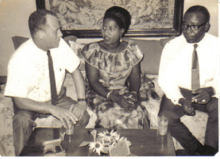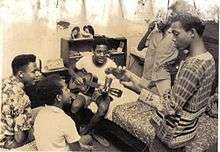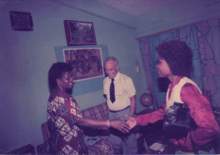Beattie Casely-Hayford
.png)
Beattie Casely-Hayford (June 1922 – 6 August 1989) was a Ghanaian engineer. He was the first Director of the Ghana Arts Council, a co-founder of the Ghana National Dance Ensemble, and Director of the Ghana Broadcasting Corporation (GBC).
Family
Beattie Casely-Hayford was the eldest son of Essie and Archibald Casely-Hayford, a lawyer, Gold Coast nationalist and former Minister of Agriculture and Natural Resources in Ghana’s First Republic.[1]
Casely-Hayford’s grandparents were Beatrice Madelene (née Pinnock) and Joseph Ephraim Casely Hayford, a Gold Coast lawyer, author, journalist, educator, politician and Pan-Africanist.
Early years
Casely-Hayford was born in Sekondi, Ghana, which was then the Gold Coast, and educated at Forrest Hill House School and Dulwich College, England. His education in England was interrupted when he returned to the Gold Coast at the onset of World War II.
Casely-Hayford fitted himself into a harsh wartime life and struggled through several tough self-employed occupations. He extracted coconut oil to make soap; ran two garages for repair and spraying of cars.
Career
Casely-Hayford trained for a year in England as a Totalisator Technician for the Kumasi Race Course; and worked at the Kwame Nkrumah University of Science and Technology, then Kumasi Institute of Technology, as the Maintenance Officer. Later, he served as the Director and Operations Manager for Ghana Poultry Farm, Nungua; Director of the Arts Council of Ghana; Director of Ghana Broadcasting Corporation's Television division (GBC TV); Technical Director of Modern Signs; and then finally settled into private business.
He owned and operated Caselyco Sound Studio, Signals and Controllers, Intek Engineering, and finally Televid Video and Audio.
Ghana Arts Council
Casely-Hayford's interests spanned both the Arts and Sciences. Ghana’s former Prime Minister Dr. Kwame Nkrumah asked Nana Kobina Nketsiah to have Casely-Hayford start up the Arts Council of Ghana after the British relinquished the then Roger Club, a social club for Accra’s elite that was located on Accra's Atlantic coast.

Casely-Hayford became the first Director of the Ghana Arts Council. He was responsible for bringing to the fore the early concert party groups and plays. He also had the British Council sponsor drama performances and movies of Shakespeare plays. He also collaborated with the artist and musician Saka Acquaye, who succeeded him as the Director of the Ghana Arts Council.
Saka Acquaye’s plays were also featured at the Accra Arts Centre, including his most important and popular musical, The Lost Fishermen. The original Wulomei – a traditional folk music group that Saka Acquaye managed – was introduced to a national audience at the Accra Arts Centre.
The master drummer, percussionist and musician Guy Warren (Kofi Ghanaba) was prominently featured on several weekends. The classical musician Victor Gbeho also had the National Orchestra rehearsing and performing at the Accra Arts Centre.
Many foreign cultural exchange shows were also put on at the Accra Arts Centre. For instance, troupes from Russia and from China performed, the Chinese troupe singing a song in Twi, the local Ghanaian language.
Louis Armstrong and other American performers
Casely-Hayford was instrumental in the arrangements during the 1956 visit of Louis Armstrong, his wife Lucille, and band to Ghana.[2] Casely-Hayford helped to arrange a durbar at Achimota School, where Louis and Lucille Armstrong and the band members were entertained by Ghanaian cultural dancers and musicians.[3]
The US Information Service ("USIS") often sent performers to Ghana as part of a cultural relations program. The guitarist Charlie Byrd performed in one of such shows and ended the show with one of Jimi Hendrix's songs, "Hey Joe". Cozy Cole was another such performer.
Another American resident in Ghana, dentist Robert Lee, former Lincoln University, Pennsylvania classmate of Dr. Kwame Nkrumah, who relocated with his family to Ghana from the US, taught voice and was also often on stage.
Cultural shows and pop competitions

Casely-Hayford collaborated with Prof. Mawure Bertie Opoku of the Institute of African Studies, University of Ghana, Legon, and together they established the Ghana National Dance Ensemble.
In the early 1960s, Casely-Hayford introduced the Do Show, a talent show that was open to all through auditions. One of the products of the Do Show is the Paris-based singer Bibie Brew.
The Ghanaian teens of the 1960s also had their chance and several Pop music competitions were held at the Arts Centre. Casely-Hayford’s five sons all played guitar in their teens. His oldest son, Ralph, a bassist, and a nephew, Roy, played in one of Ghana’s professional pop bands, “The Saints” and they performed at the Accra Arts Centre.
Broadcasting and puppeteering
Casely-Hayford developed and promoted puppets and the craft of puppeteering. In addition to puppet shows at the Arts Centre, he also had the puppeteering team visit schools to give performances.
He was transferred to Ghana Broadcasting Corporation (GBC) as the Cultural Liaison Officer under Shirley Du Bois. Eventually, he was appointed Director of GBC. One of the things that he developed for GBC TV News (now GTV News) was the rotating globe that was used for years until computer graphics took over.
He also introduced puppet shows on GBC TV. Some of the puppet shows were based on the popular traditional concert party theatre format.
.jpg) Beattie Casely-Hayford demonstrates puppets, GBC, 1968
Beattie Casely-Hayford demonstrates puppets, GBC, 1968.jpg) GBC Puppet Show, developed by Beattie Casely-Hayford, 1968
GBC Puppet Show, developed by Beattie Casely-Hayford, 1968 GBC Puppet Show, developed by Beattie Casely-Hayford, 1968
GBC Puppet Show, developed by Beattie Casely-Hayford, 1968
Music and literary work
Casely-Hayford was an active member of the Ghana Writers Guild and did a lot of work with the renowned poet and writer Atukwei Okai. He was also a jazz pianist. His father, Archie, was a pianist and a composer and his mother, Essie, also played piano and loved to sing and perform.
The traditional guitarist Koo Nimo had a lasting relationship with Casely-Hayford and shared many recording hours in later years. Casely-Hayford gave several lectures on Ghana’s highlife music; collaborated with the University of Ghana Music Professor John Collins; and served as a founding patron of Bokoor African Popular Music Archives Foundation (BAPMAF), an NGO that Prof. John Collins established in 1990 soon after Casely-Hayford's death in 1989.[4]
Engineering work
Casely-Hayford's true passion lay in manufacturing and engineering. Everywhere he lived with his family, he kept his cars outside the garage because he used the garage as an engineering workshop. He involved his five sons in his engineering work and projects.
 Garage Workshop, Kanda, Pinnock and Sydney, 1971
Garage Workshop, Kanda, Pinnock and Sydney, 1971.jpg) Garage Workshop, Kanda, Pinnock and Sydney, 1971
Garage Workshop, Kanda, Pinnock and Sydney, 1971 Beattie in his Caselyco Studio with his sons Leo and Sydney
Beattie in his Caselyco Studio with his sons Leo and Sydney Beattie in his Caselyco Studio with his sons Leo and Sydney
Beattie in his Caselyco Studio with his sons Leo and Sydney
Alternative energy
Casely-Hayford believed that the solution to Ghana's persistent energy problems lay in alternative energy. The last project he undertook before he died in 1989 was the installation of alternative energy windmills at Weija, in the western part of the Greater Accra Region.
 Windpump hoisting, Weija
Windpump hoisting, Weija Windpump up and released, Weija
Windpump up and released, Weija Windpump up and running, Weija
Windpump up and running, Weija Wind Corpus Savonius, Accra
Wind Corpus Savonius, Accra
Beattie Casely-Hayford's son, Pinnock Casely-Hayford, an engineer who worked closely with him, has continued his work in the alternative energy sector, through his company "Breeze and Windy".
Social work
From 1986 to 1989, Beattie Casely-Hayford worked with his son Pinnock Casely-Hayford to film the first HIV/AIDS patient at Korle-Bu Teaching Hospital's Fevers Ward that was operated by Dr. Neequaye. Later on, Casely-Hayford collaborated with Prof. Kwashi Quartey and Dr. Cecilia Bentsi as they visited and treated many AIDS victims. They travelled as far as Somanya and documented their visits on video as they went along.
Final years

Casely-Hayford was a member of the Bahá'í faith[5] from 1973. In 1986, he led a Bahá'í delegation to deliver a Peace message to the Ghana Government led by the then Flt. Lt. Jerry John Rawlings.
Beattie Casely-Hayford died in his sleep early on Sunday morning, 6 August 1989, at 67 years of age.
References
- ↑ " The men who flanked Nkrumah on Independence eve", National Commission on Culture, 14 April 2007.
- ↑ Penny Von Eschen, Satchmo Blows Up the World: Jazz Ambassadors Play the Cold War, Harvard University Press, 2004, p. 61.
- ↑ Louis Armstrong’s visit to Ghana.
- ↑ "About Us", Bokoor African Popular Music Archives Foundation.
- ↑ "Official urges study of 'noble principles'", Bahá'í World News Service, 28 August 2004.
- John Collins, "The Ghanaian Concert Party: African Popular Entertainment at the Crossroads", 1994
- John Collins, West African Pop Roots, Temple University Press, 2010
External links
![]() Media related to Beattie Casely-Hayford at Wikimedia Commons
Media related to Beattie Casely-Hayford at Wikimedia Commons